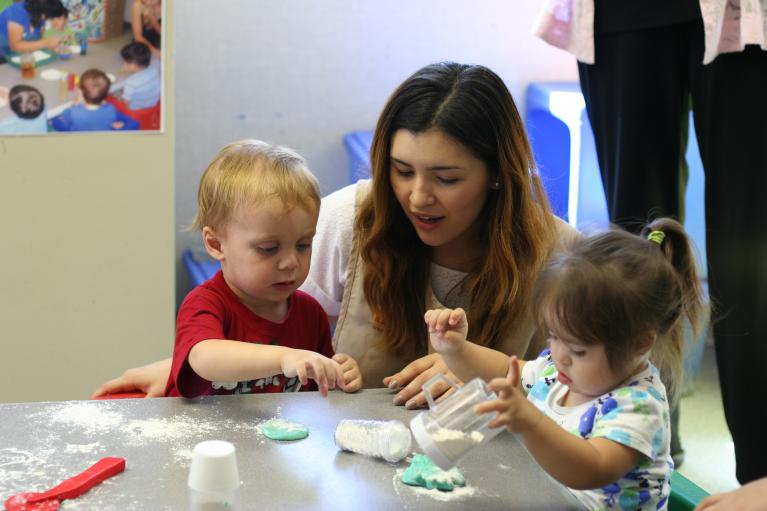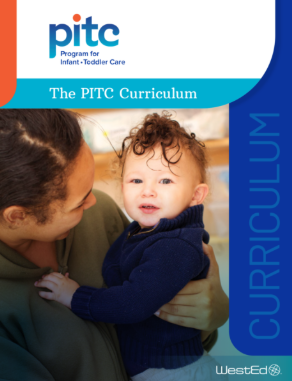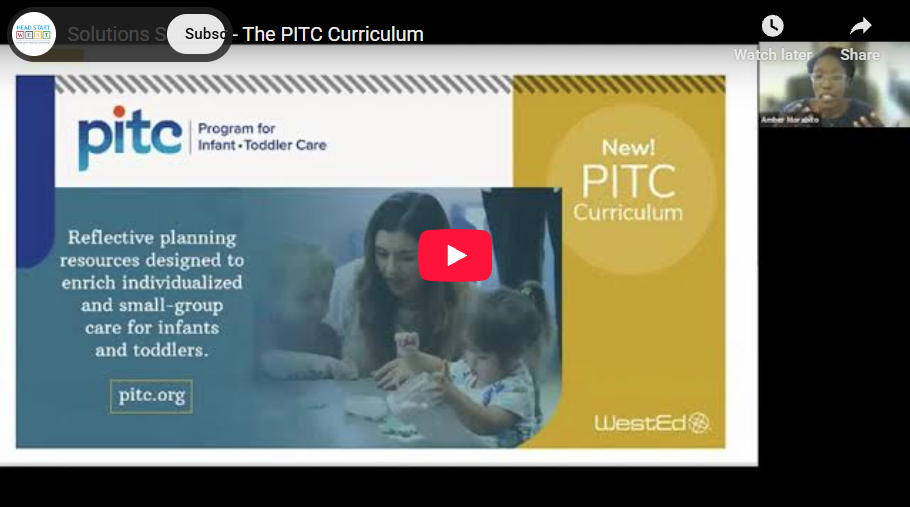PITC Curriculum Technical Assistance Services
PITC technical assistance services enhances the fidelity of curriculum implementation, helping infant care educators reflect on and implement relationship-based curriculum planning.

Using the PITC Curriculum tools, resources, and the reflective curriculum planning process, early childhood educator deepen their knowledge, understanding, and implementation of curriculum.
The technical assistance services offered are:
- Coaching: The PITC coaching enhances fidelity and supports child care educators in delivering quality individualized learning and development.
- Community of Practice (CoP): The CoP support helps educators share and learn with others by enhancing their PITC Curriculum implementation skills.
PITC coaching aids curriculum fidelity, helping care educators reflect on and implement relationship-based curriculum planning. Each FCC home/classroom selects two focus areas from the PITC Curriculum fidelity tool for support.
Coaching Includes:
- A pre-leadership meeting
- A coaching cycle, which consists of 3 hours of coaching and classroom or FCC engagement
- A post-leadership meeting
Early care educators that are a part of PITC Curriculum Community of Practice (CoP) will have the opportunity to come together as a community of professionals, access support in the use of the PITC Curriculum, and sharpen their skills in interpreting observations of children in meaningful ways to support effective curriculum planning. It will begin with a refresher and continue to dive deeper to improve understanding of infant toddler development and use of the PITC Curriculum tools to support curriculum development.
The CoP includes:
- A pre-leadership meeting
- Six one-and-a-half-hour reflective facilitated sessions
- A post-leadership meeting
For more information about the PITC Curriculum Technical Assistance Services, please contact Amber Morabito.
Coaching: Cost may vary based on the modality of the coaching (in-person, hybrid, virtual). Programs and agencies must decide how many cycles of coaching to purchase.
Community of practice: Cost may vary based on the modality of the coaching (in-person, hybrid, virtual).
Technical assistance is led by experts in early learning and care authorized to train on the PITC Curriculum.
Early care educators such as family child care and center-based programs, leadership teams, Early Head Start programs, and coaches.
Upon completion of the technical assistance services, verification of professional development hours can be requested.
These are resources that can potentially support your understanding of child development and tools that support learning and development.
- Supporting Healthy Development for Infants and Toddlers: Q&A with Amber Morabito.
- Frequently Asked Questions About the PITC Curriculum Planning Tool.
- Head Start Early Learning Outcomes Framework (ELOF).
- Infant/Toddler Learning and Development Foundations in your state.
- A Developmental Continuum from Every Infancy to Kindergarten Entry (DRDP).
- Early Head Start Performance Standards.
- “See it in Practice”: How can you implement PITC’s six essential policies in your setting? Check out resources that show how PITC can work for you!
- Information on how to purchase The PITC Curriculum in English and/or Spanish.
Informational Resource about the PITC Curriculum
Presented by Amber Morabito and Diane Harkins
Learn about the Program for Infant/Toddler Care (PITC) Curriculum. This curriculum is unique and purposeful - a focus on zero to three with an emphasis on relationship-based care, cultural and linguistic responsiveness, individualized care and meaningful partnerships with families.
In this Region 9 EHS conference webinar, you will learn about the intentional planning process based on reflection, observation, and documentation of play and learning in the five domains of the Head Start Early Learning Outcomes Framework that centers the child's interests and needs. This planning process helps support the efforts of family child care and center-based care teachers to facilitate high-quality individualized learning and healthy development for infants and toddlers.
Resources we think you'd be interested in...
What people are saying...
"What stood out was how to use the planning tool to then create lesson plans that cover the DRDP."
"The Cop has continued to support my implementation and understanding of the way the tool connects and is threaded through all domains. Through the CoP I can get support and ideas while also asking clarifying questions."
"I have been able to integrate the curriculum more seamlessly through the accountability and support of the CoP while sharing how I'm utilizing it to support the younger learners in a mixed aged environment."

